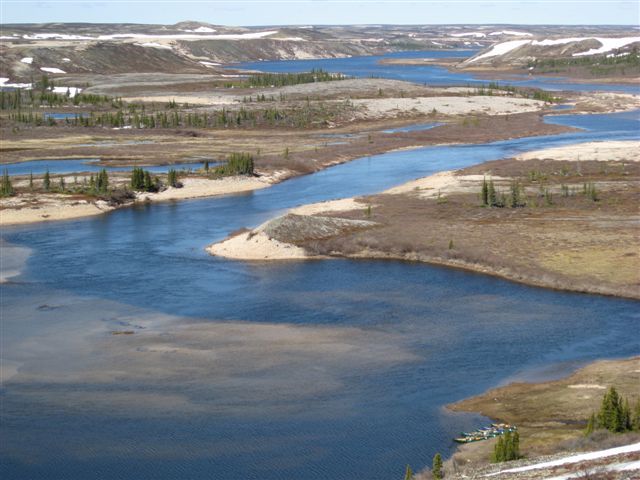J
Maybe my English isn't my 1st language and maybe I'm not as good as expressing myself like you but I can say that I have had no intention of mocking anyone regardless of what their equipment. All I hope i've said is that the people i see on the norther rivers carry more equipment than us much of which we have no need for. So I also don't understand your comment regarding my tone. But no bother I've explained.
2. Throw lines we don't use or have. We do have rope when we need to rope a canoe up or down river. When I've guided europeans and canadians if they capsize it is mostly in rapids. The rivers I've been on guiding have very long sections of rapids where you could not use throw line. No where to stop, too many snags/trees/boulders. But I am aware that they are common on smaller rivers amongst none Dene recreational paddlers. I've seen them used on the Petawawa which is small river.
3. I did not know you had big rivers 7 miles wide thats bigger than most of ours. where is such a river? (I'll get one of our volunteers to find me a video of a river up here and she can put it on line.) maybe that is better than I can explain.
4. I have difficulty explaining about 1st aid. To us there is nothing much we'd need one for. Small cuts and the like are we normally get. I guess if someone broke a leg we'd have to bring him out of the bush. I agree with your point that a big injury would be fatal. But I guess people die also in England with accidents. I've seen no fatal accidents here aside from a builder working on a roof of a office building.
5. To me a bush/bow saw already has a saw blade.
Joe
I hope this is the right tone.
Maybe my English isn't my 1st language and maybe I'm not as good as expressing myself like you but I can say that I have had no intention of mocking anyone regardless of what their equipment. All I hope i've said is that the people i see on the norther rivers carry more equipment than us much of which we have no need for. So I also don't understand your comment regarding my tone. But no bother I've explained.
2. Throw lines we don't use or have. We do have rope when we need to rope a canoe up or down river. When I've guided europeans and canadians if they capsize it is mostly in rapids. The rivers I've been on guiding have very long sections of rapids where you could not use throw line. No where to stop, too many snags/trees/boulders. But I am aware that they are common on smaller rivers amongst none Dene recreational paddlers. I've seen them used on the Petawawa which is small river.
3. I did not know you had big rivers 7 miles wide thats bigger than most of ours. where is such a river? (I'll get one of our volunteers to find me a video of a river up here and she can put it on line.) maybe that is better than I can explain.
4. I have difficulty explaining about 1st aid. To us there is nothing much we'd need one for. Small cuts and the like are we normally get. I guess if someone broke a leg we'd have to bring him out of the bush. I agree with your point that a big injury would be fatal. But I guess people die also in England with accidents. I've seen no fatal accidents here aside from a builder working on a roof of a office building.
5. To me a bush/bow saw already has a saw blade.
Joe
I hope this is the right tone.

